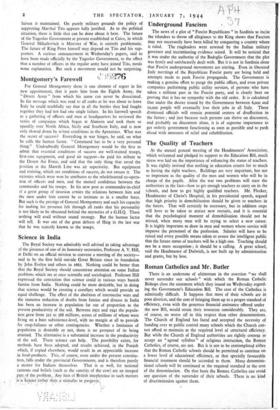Science in India
The Royal Society was admirably well advised in taking advantage of the presence of one of its honorary secretaries, Professor A. V. Hill, at Delhi on an official mission to convene a meeting of the society— said to be the first held outside Great Britain since its foundation by John Evelyn and others in 1662. Nothing could be better than that the Royal Society should concentrate attention on some Indian problems which are at once scientific and sociological. Professor Hill expressed the conviction that science could in various ways banish famine from India. Nothing could be more desirable, but in doing that science would be creating a corollary which would provide an equal challenge. The effect of the abolition of internecine wars and the immense reduction of deaths from famine and disease in India has been an increase in population far out of proportion to the present productivity of the soil. Between 1921 and 1941 the popula- tion grew from 321 to 388 millions, scores of millions of whom were living on a bare subsistence-level, with no margin at all to provide for crop-failures or other contingencies. Whether a limitation of population is desirable or not, there is no prospect of its being attained. The alternative is a substantial increase in the productivity of the soil. There science can help. The possibility exists, for methods have been adopted, and results achieved, in the Punjab which, if copied elsewhere, would result in an appreciable increase in food-products. This, of course, even under the present constitu- tion, falls under the provincial Governments, and is therefore purely a matter for Indians themselves. That is as well, for national customs and beliefs (such as the sanctity of the cow) are an integral part of the.problerp.. Any hint of British, interference in such matters 'is '41`rather than a stimuli's' te •psogreis.`






















 Previous page
Previous page